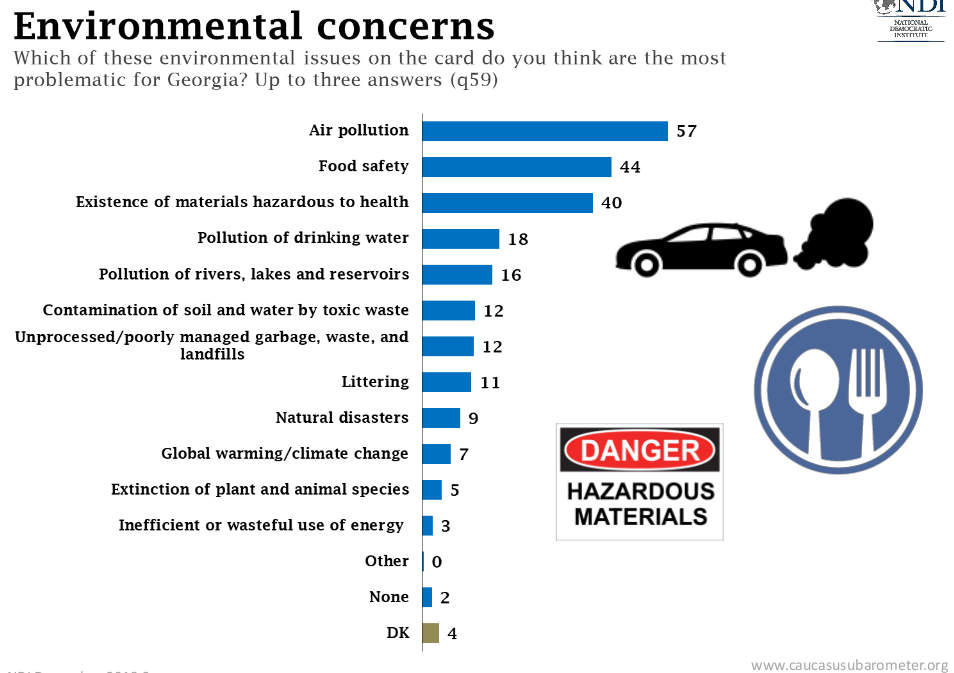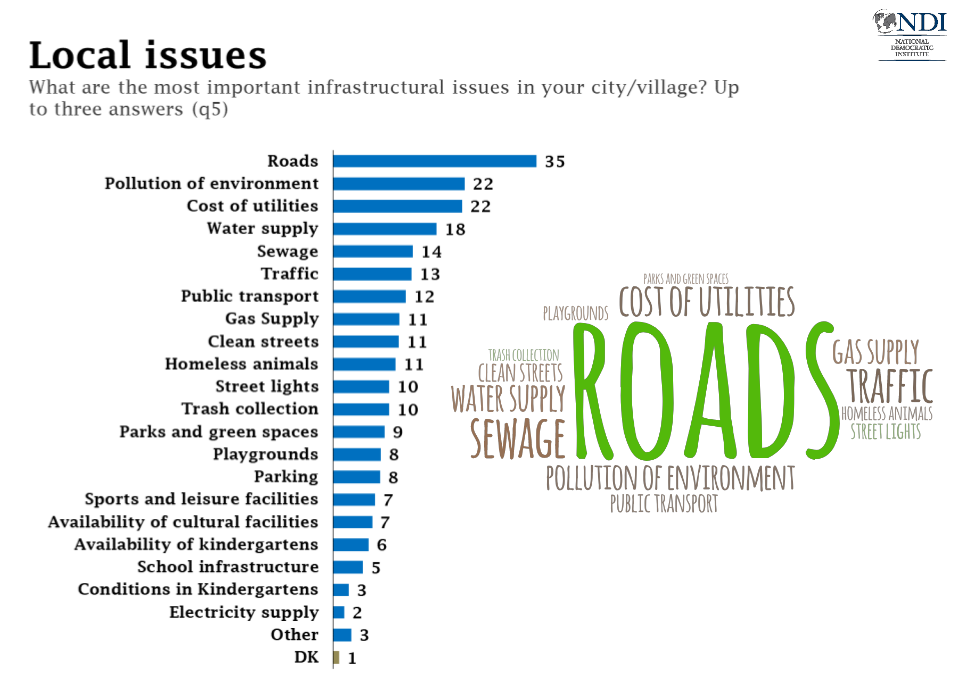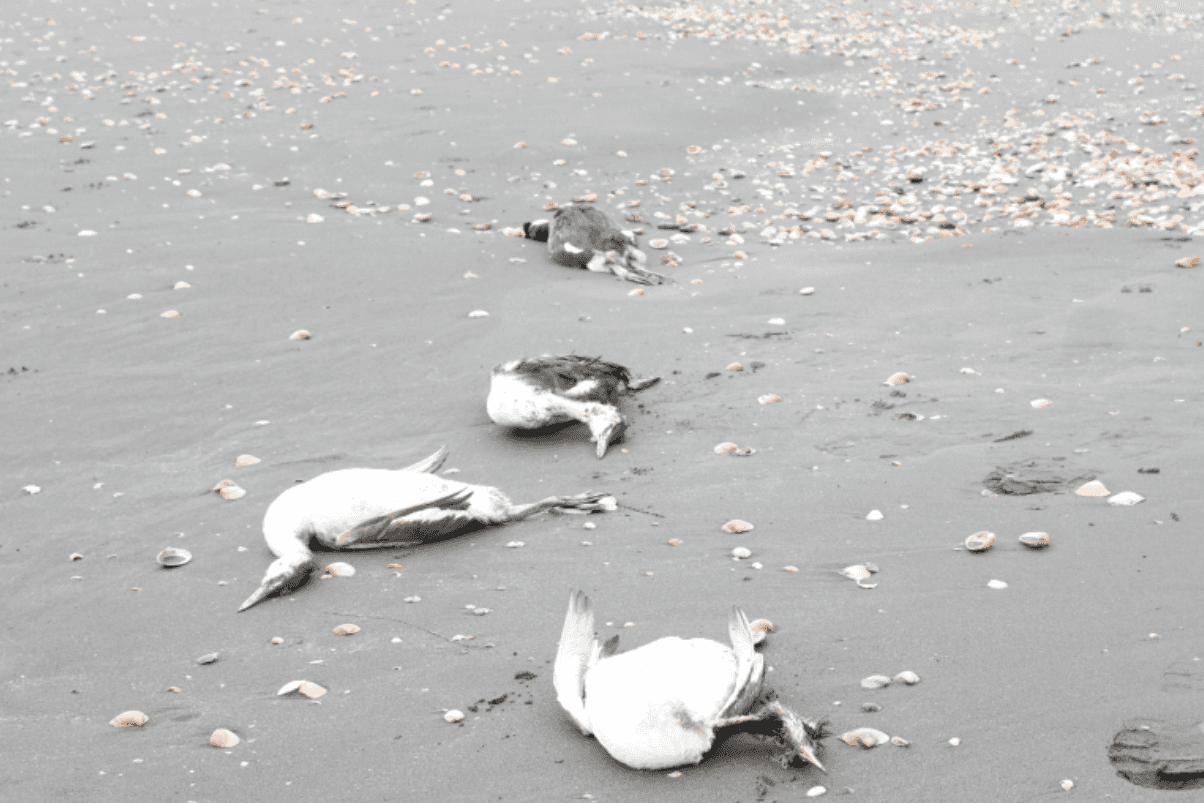

Air pollution is the number one environmental concern in Georgia, according to a new poll released by NDI. The poll showed a growing awareness of environmental topics in Georgia, with the capital Tbilisi leading the way.
The survey, commissioned by the Washington-based National Democratic Institute (NDI) and carried out by Caucasus-based think-tank CRRC-Georgia, questioned over 2,200 people across Georgia.
According to the results released by NDI on 28 January, air pollution (57%), food safety (44%), and hazardous materials and toxins in air, food, toys, and elsewhere (40%) were the top three pressing environmental concerns named by respondents.

In Tbilisi, the responses yielded a similar rankings, but air pollution was named far more frequently, by 76% of respondents.
In the specific category of local and infrastructural concerns among Georgia’s urban and rural dwellers, air pollution came second (22%), following roads, with the exception of Tbilisi where it was the most important local infrastructural concern (48%), topping sensitive urban concerns such as the cost of utilities, traffic, and public transport.

This marks a 4 percentage point rise in public awareness of environment pollution outside Tbilisi (from 18% to 22% among local issues), and a 10 percentage point spike among Tbilisi residents (from 38% to 48%) since June 2016.
In the list of wider ‘national issues’, environmental protection came 10th (12%).
NDI also asked respondents what they thought of the performance of the Environmental Protection Ministry. The most frequent answer (36%) was ‘don’t know’.
According to NDI, the survey was carried out through face-to-face interviews on 6–20 December, with an average margin of error of +/− 2.1%.
‘We know that there’s lead in our blood’
The poll came several days after urban and green activists celebrated a victory in Tbilisi. Mayor Kakha Kaladze announced on 25 January that the controversial Budapest Hotel would not be built in the city’s central Vake Park.
In recent years, several local groups like Guerrilla Gardening Tbilisi and Tiflis Hamkari have been critical of municipal authorities for the city’s diminishing green zones and pedestrian space, as well as of ‘uncontrolled’ development projects which they have said endanger Tbilisi’s cultural heritage.
A September 2018 gathering in Tbilisi against poor air quality highlighted growing public awareness towards suspected air polluters: vehicles lacking mandatory technical inspections and loosely regulated construction sites that contaminate the air with dust.
In recent years, exposure to lead as airborne particles, as well as from food and paint used in old buildings and on imported toys has gradually become one of the central public health issues in Georgia.
This led UNICEF Georgia to include testing for lead prevalence in their currently underway Multiple Indicator Cluster Survey, checking about 1,500 children aged two through seven for exposure, as well as the water in households.
[Read more on OC Media: Lead: Georgia’s silent killer]
Maia Kurtsikidze from UNICEF Georgia told OC Media that fieldwork was already over and the blood samples were being sent to labs in Italy. She said the results were expected to be made public in March at the earliest.
Environmental activist Nata Peradze said that when she and several others founded Guerrilla Gardening Tbilisi in 2013, few people mentioned ecological concerns in surveys, and the fact that people ‘acknowledge the problems’ after five years ‘is a big achievement’.
‘Now we must all get involved […] Winning against the Budapest Hotel should become a stimulus for numerous fronts. Today, we know that there’s lead in our blood, but we’re not quite sure how much is in the air, in our food, in [water] pipelines, and how much we are exposed from exhaust fumes and construction sites’, Peradze told OC Media.
She named the fight for green zones and pavements as the most appealing campaign issues for the public, while construction and construction dust gets ‘the least attention’.
According to Peradze, an approach by the authorities of never saying no to ‘saint investors’ was over. She said City Hall should now cancel construction permits issued by the previous city governments instead of ‘just pointing the finger at them’.









